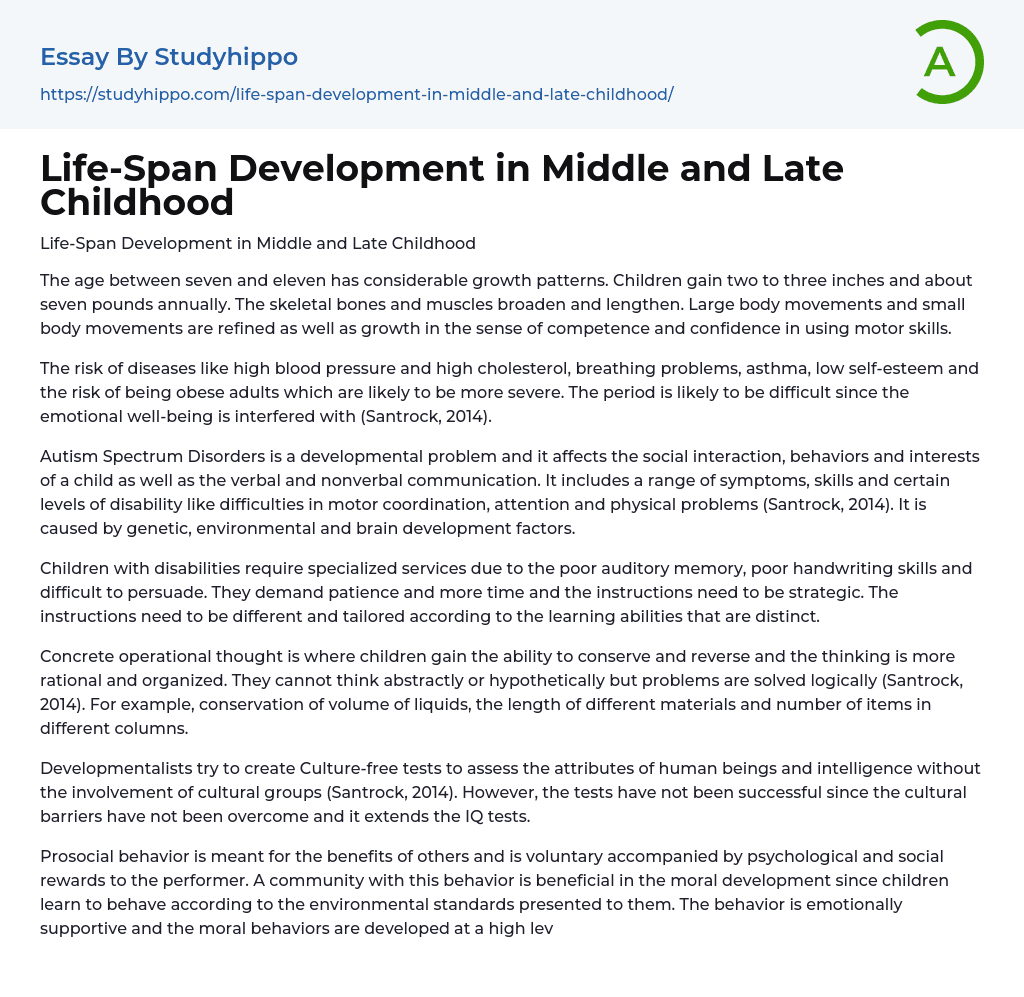Life-Span Development in Middle and Late Childhood
The age between seven and eleven has considerable growth patterns. Children gain two to three inches and about seven pounds annually. The skeletal bones and muscles broaden and lengthen. Large body movements and small body movements are refined as well as growth in the sense of competence and confidence in using motor skills.
The risk of diseases like high blood pressure and high cholesterol, breathing problems, asthma, low self-esteem and the risk of being obese adults which are likely to be more severe. The period is likely to be difficult since the emotional well-being is interfered with (Santrock, 2014).
Autism Spectrum Disorders is a developmental problem and it affects the social interaction, behaviors and interests of a child as well as the verbal and nonverbal communication. It includes a range of symptoms, skills and certain levels of disability like di
...fficulties in motor coordination, attention and physical problems (Santrock, 2014). It is caused by genetic, environmental and brain development factors.
Children with disabilities require specialized services due to the poor auditory memory, poor handwriting skills and difficult to persuade. They demand patience and more time and the instructions need to be strategic. The instructions need to be different and tailored according to the learning abilities that are distinct.
Concrete operational thought is where children gain the ability to conserve and reverse and the thinking is more rational and organized. They cannot think abstractly or hypothetically but problems are solved logically (Santrock, 2014). For example, conservation of volume of liquids, the length of different materials and number of items in different columns.
Developmentalists try to create Culture-free tests to assess the attributes of human beings an
intelligence without the involvement of cultural groups (Santrock, 2014). However, the tests have not been successful since the cultural barriers have not been overcome and it extends the IQ tests.
Prosocial behavior is meant for the benefits of others and is voluntary accompanied by psychological and social rewards to the performer. A community with this behavior is beneficial in the moral development since children learn to behave according to the environmental standards presented to them. The behavior is emotionally supportive and the moral behaviors are developed at a high level (Santrock, 2014).
Gender stereotypes are the concepts people have about male and female in their behaviors. The society has a set of norms that dictate how people should behave which is basically the appropriate and acceptable behavior in men and women. Males and females are expected to have different behaviors (Santrock, 2014). For instance, people believe that women are better caregivers and not combat. The household chores are believed to belong to the females while provision of security should be for the male.
The personality and how a person connects and share emotions with people determine friendships. The family life and what a child is exposed to as well as the presence or absence of siblings determines the friends in a person’s life. The way in which a person handles unwanted friends and the activities a person is involved in determine the types of friends one is able to have.
The brains of children living in poverty adapt to the conditions and it affects the performance in school. Health and nutrition as well as vocabulary are major issue in children living with poverty a. They are faced with emotional
and social challenges, acute and chronic stressors on a regular basis and there are health and safety issues in their lives. These factors lead to their lag in cognitive level, they cannot make friends easily and the teachers conclude that they do not put much effort, thus, learning is difficult (Santrock, 2014).
References
- Santrock, J. W. (2014). Essentials of life-span development. McGraw-Hill.
- Anorexia essays
- Breakfast essays
- Caffeine essays
- Chewing gum essays
- Child Development essays
- Chocolate essays
- Diet essays
- Dieting essays
- Eating essays
- Eating Habits essays
- Energy Drink essays
- Food essays
- Genetically Modified Food essays
- Genetically Modified Organisms essays
- Junk Food essays
- Metabolism essays
- Milk essays
- vegetarian essays
- Vitamin essays
- Weight Loss essays
- Business Analysis essays
- Business Plan essays
- Community Development essays
- Competition essays
- Effective Leadership essays
- Leadership Styles essays
- Mission Statement essays
- Negotiation essays
- Outsourcing essays
- Planning essays
- Public relations essays
- Reasoning essays
- Strategic Management essays
- Strategic Planning essays
- Swot Analysis essays
- Classroom essays
- College essays
- E-Learning essays
- Elementary School essays
- Examination essays
- Graduate School essays
- High School essays
- History Of Education essays
- Homeschooling essays
- Kindergarten essays
- Middle School essays
- Public School essays
- School essays
- Single Sex Schools essays
- Special Education essays




